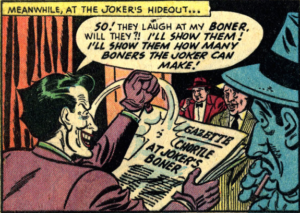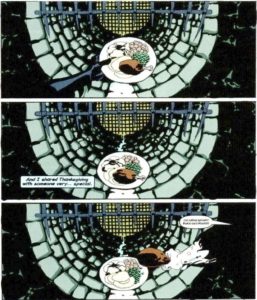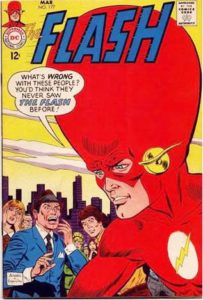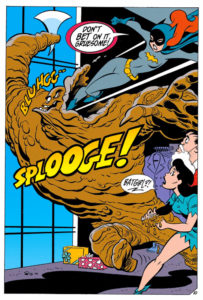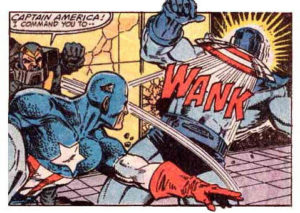I’m about to talk about how comics are a great way to learn about writing, and I’m about to do that by talking about a story I invented as a youngster where the Flash’s head filled up with semen until it nearly burst. It’s a world of contrast here on the site, I’ll say that. And it’s exactly this sort of thing that makes me feel like I made the right choice to do these. This is a lecture I don’t think you could give in a classroom.
From the age of, eh, 14-19, I read comics almost exclusively. I DID read shit for school, and that really presented the contrast. I’d be reading Chaucer for school, and then I’d go home and read Garth Ennis or Warren Ellis or Grant Morrison. The contrast didn’t work out so well for Chaucer. In comics I found stories where stuff happened! We didn’t have to wait so damn long. In 22 pages, you basically get Of Mice And Men. Just, y’know, a little different. Batman fights Solomon Grundy, realizes Grundy doesn’t really know what he’s doing, and with a gesture, in 3 panels, Batman finds a way to forgive Grundy.
I loved comics. Books were boring.
This gets into a whole thing I have about canon, about the fact that we’ve canonized a lot of books, and in canonizing them have decided that they should be the introduction to books for America’s teenagers. It gets into this whole thing about how stupid that is, about how there’s a difference between which books are important and which books will provide a good introduction to books and reading.
Yes, there are plenty of people out there who will say, “But I loved Shakespeare in high school!” And for those students, I think that’s great, and I would also pose the theory that you would have discovered Shakespeare on your own. Meanwhile, all of us are marched through a couple plays, and most of us end up thinking that books and reading aren’t for us.
But I don’t want to talk about that right now. I want to talk about what I learned about writing from all those comics.
If you need to learn how to write dialogue, you need to read comics. Comics have a great blend of dialogue and narration. Rarely is it possible in comics for the narration to do the heavy lifting, and almost never is the narration coming from a third-person, omniscient standpoint.
In my efforts here, I want to clarify some terms too. When I say third-person omniscient, what that means is the narrator knows everything (omniscient) and is narrating in third person, which sounds like “Steve went to the store,” as opposed to “I went to the store,” or “You went to the store.”
I’m not a huge fan of the omniscient narrator. The reason being, curious readers will always wonder who this narrator is. They’ll wonder how they know so damn much. And the narration coming from outside the story makes it a lot harder to get detailed with the physical sensations of the characters. You can tell me the character burned his hand, but it’s harder to tell me exactly how that feels.
In a comic, it’s hard to use an omniscient narrator. If Spider-Man is swinging around, you might see thought balloons, you might see dialogue boxes that show what Spider-Man is thinking. He might even talk to himself aloud. But it’s pretty rare to have a faceless narrator who seemingly knows everything and tells the entire story FOR a character.
One great thing about learning to write from comics, you get A LOT of versions of the first-person narrator.
The other thing is, comics rely on dialogue to get the job done. Relying heavily on dialogue means that you have to strike a balance. It’s hard to push the plot with dialogue and make it seem natural. In prose, it’s almost impossible without making the dialogue sound like an interrogation of some kind. In TV, it’s easier because you’ve got actors, you’ve got visuals, and all of that can come together to give the doalogue room to screw around. Comics are the middleground. Some images, some expository dialogue, and some need to reign it in.
Finally, comics can teach you a lot about story length. A weird question that a lot of beginning writers will bring up is how long something should be. Longtime writers know that, for the most part, it should be as long as it needs to be to tell the story. No more, no less. Occasionally you’ve got a contest with some rules or you’re working for an outlet online, and then you’ve got a limit set. But for the most part, you’re going to find that the story is as long as it is. The more practice you get, the easier it will be to tell how long something might be, and the earlier in the process of writing you’ll know. But it’s an imperfect science, to say the least, and what comics can do is help you recognize:
A) What makes a good story if that story needs to be wrapped up inside of 22 pages
B) What makes a story go longer
C) How to create smaller endings/climaxes within a larger story that spans multiple books, and how to set these up so readers can read the different parts 30 days apart
D) When a story is being stretched or compressed depending on the needs of the publisher (once you can see this, you can’t unsee it, and maybe 30% of your comic book reading experiences will be worse for the knowledge).
As with any good exercise in writing, this one involves some reading and some writing.
For starters, read some comics. It doesn’t matter what they are. But if you’re unsure, my recommendation is that you either hit up your local comics shop or library. Both will have more than enough material, and both will have at least one expert in the field.
If you really have no idea, and if you really don’t like comics, I’ll recommend four books. Two are for those of you who like to read books ABOUT writing, and the other two are books that are good examples of good writing.
One is 99 Ways To Tell A Story by Matt Madden. In the book, Madden tells the same very basic story 99 different ways. Take a look here to see what I mean: http://mattmadden.com/comics/99x/discover-99-ways-to-tell-a-story-exercises-in-style/
The second is Understanding Comics by Scott McCloud. This is a really great book for anyone who gives a shit about storytelling. It’s recommended all the time, and there’s a reason for that.
On the straight-up writing side, I’ll send you towards Drinking Alone At The Movies by Julia Wertz. This is a funny indie comic that manages to avoid romance almost completely. It’s an indie, so if you’re not into superpowers, or if you’re not sure what comics look like when everyone’s underwear is worn inside their pants, you’re all set.
Then, Howard the Duck by Chip Zdarsky. It’s funny, and it also gets a little poignant at times. Great book, and it’s in the world of mainstream comics without being beholden to them. A real lesson in subtle but effective world-building.
Assignment part one: Read Something. One of the above or something of your choice. If you want to write and you don’t want to read, you’re going to have a tough fucking time of it, guaranteed.
Here’s the writing part.
I took this exercise from a book I read one time. I think it was a book by Jim Munroe, but it’s been so long that I can’t remember.
In the book, characters use wite-out to cover up all the word balloons in comics, and then they go through and write in their own dialogue, creating their own stories.
I did this myself. A few times. Most memorably on a Flash comic where Flash was shot with a ray and his head looked like this:
As a note, it wasn’t this actual issue. It was a re-tread of this story done in a kiddie book. Believe me, I wasn’t destroying a book with anything resembling a high price point.
I grabbed my wite-out, blanked all the word balloons, and then wrote in my own story. Which was about the Flash’s head filling with semen. As an adult I write about ninja boys, so while I’d like to say I’ve come a long way…
Here’s what’s cool about doing this: You have to write dialogue, and you have some strict limits set. You’ll be surprised how small these balloons are. You’ll be surprised how hard it is to tell a story that makes sense.
Here’s your assignment:
Go to a comic store, get a dollar book (they have some somewhere, trust me), and take it home. Grab some wite-out and clear out all the word balloons and narration boxes. All the text. But you can leave sound effects, especially if they’re hilarious
And, you know, if there’s some truly fabulous dialogue, it’s cool to leave some of that here and there.
When you’ve got everything cleaned out, go back through and write in your own dialogue.
A couple rules and pieces of advice:
+If you can, avoid seeing what the book is about originally. It’s easier if you go from a blank slate. If you wanna watch a movie or something while you wite-out, that helps.
+Flip through the entire thing, find the high points, and then figure out where you’re starting, where you need to end, and where you might want to be in the middle. This helps.
+When you’re selecting a comic, find something with a good amount of dialogue, and comics that aren’t heavy on visuals helps. For example, an Archie-type comic where a lot of the business happens in the words is a great choice.
+Your finished product should be a story. Not just jokes or random talking. It should have a beginning, middle, and an end.

